Imagine transforming a bland dish into a culinary masterpiece with just a sprinkle of herbs and spices. It’s not just about adding flavor; it’s about creating a healthier, more vibrant meal that tantalizes your taste buds and nourishes your body. Let’s dive into the wonderful world of healthy cooking with herbs and spices.
Herbs and spices have been cherished for centuries, not only for their incredible flavors but also for their medicinal properties. Take garlic, for instance – it’s not just for warding off vampires! Garlic is packed with antioxidants and has been shown to lower cholesterol and boost the immune system. And what about turmeric? This golden spice is a powerhouse of anti-inflammatory compounds that can help reduce joint pain and improve digestion.
When it comes to cooking, herbs like basil, cilantro, and mint bring a fresh, aromatic punch to salads, soups, and sauces. They’re rich in vitamins and minerals, adding nutritional value without extra calories. Spices such as cinnamon and nutmeg can turn a simple breakfast into a cozy treat, with added benefits like stabilizing blood sugar levels.
One of the best things about cooking with herbs and spices is the creative freedom they offer. You can experiment with different combinations to find your perfect flavor profile. Whether you’re whipping up a zesty marinade for grilled chicken or simmering a comforting pot of curry, herbs and spices allow you to tailor your meals to your preferences and health goals.
But it’s not just about taste and health benefits – using herbs and spices can also help you cut down on salt and sugar in your recipes. This is especially important for those watching their sodium intake or managing diabetes. By enhancing flavor naturally, you can enjoy delicious meals without compromising on health.
So, next time you’re in the kitchen, don’t underestimate the power of herbs and spices. They’re not just condiments; they’re culinary superheroes that can elevate your cooking to new heights. Whether you’re a seasoned chef or a kitchen novice, experimenting with herbs and spices is a delicious journey worth taking.
Unlocking Flavor: Healthy Cooking Tips with Herbs and Spices
Imagine transforming your everyday meals into culinary masterpieces bursting with flavor and goodness. It’s all possible with the magic of herbs and spices. These tiny yet powerful ingredients not only enhance taste but also pack a nutritional punch, making your dishes healthier and more enjoyable.
One of the keys to unlocking this flavor potential lies in knowing how to use herbs and spices effectively. Start by understanding their individual characteristics – some, like basil and cilantro, add freshness and brightness, perfect for salads and marinades. Others, such as cumin and paprika, bring warmth and depth, ideal for hearty stews or grilled meats.
When cooking with herbs, consider their texture and how they release flavors. Fragile herbs like parsley and dill are best added towards the end of cooking to preserve their delicate taste. Robust herbs such as rosemary and thyme can withstand longer cooking times, infusing dishes with their aromatic essence.
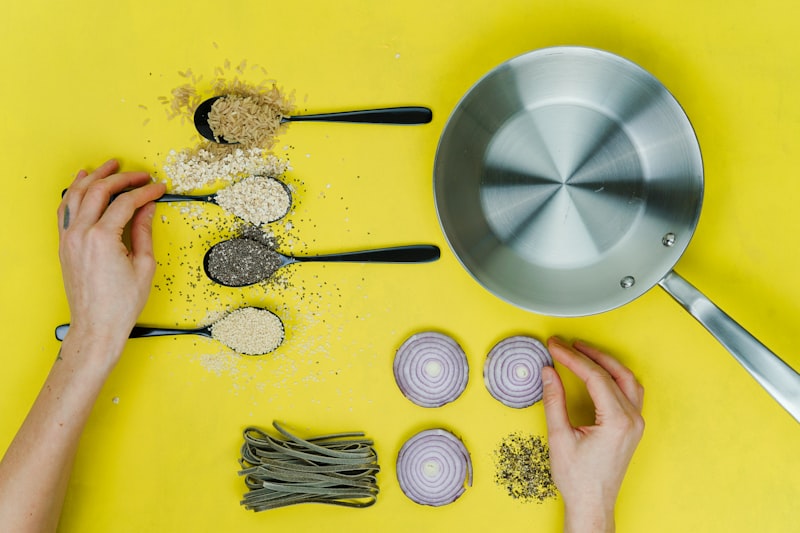
Spices, on the other hand, often come in dried form and can be ground to release their full flavor. Experiment with combinations like cinnamon and nutmeg for sweet treats, or turmeric and ginger for savory curries, each adding not just taste but also beneficial antioxidants and anti-inflammatory properties to your meals.
To maximize flavor without relying on excessive salt or unhealthy fats, use herbs and spices liberally. They offer a low-calorie way to enhance dishes, making healthy eating a delight rather than a chore. Whether you’re a novice or a seasoned chef, embracing the versatility of herbs and spices opens up a world of culinary creativity and nutritional benefits.
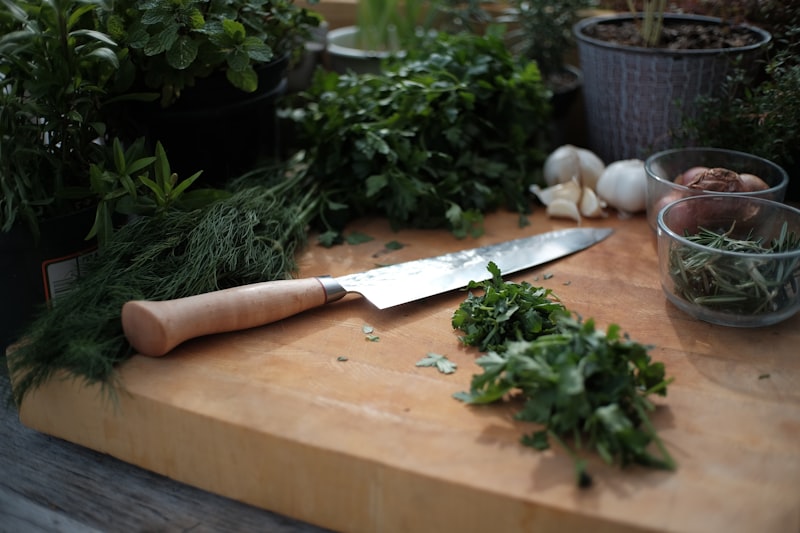
Unlock the potential of your cooking today with these simple yet transformative tips. Let your taste buds guide you as you explore the endless possibilities of herbs and spices in creating delicious, wholesome meals.
Spice Up Your Health: Essential Herbs for Nutritious Cooking
Are you ready to transform your cooking into a flavorful adventure that’s not only delicious but also incredibly healthy? Adding a dash of herbs to your dishes can do wonders for both taste buds and well-being. These essential herbs are like magic potions, enriching your meals with vibrant flavors while packing a powerful nutritional punch.
Basil, known for its fresh and slightly peppery taste, is a versatile herb that pairs perfectly with tomatoes, salads, and even pasta dishes. Its rich antioxidant content supports immune health and helps combat inflammation. Imagine a caprese salad with freshly picked basil leaves – it’s a burst of summer on your plate.
Rosemary, with its robust pine-like fragrance, adds depth to roasted meats and potatoes. Beyond its culinary charm, rosemary contains compounds that promote digestive health and may improve concentration and memory. Just a sprinkle can elevate a simple roasted chicken to a gourmet delight.
Turmeric, celebrated for its golden hue and warm, earthy flavor, is a powerhouse of health benefits. This spice, often used in curries and soups, boasts anti-inflammatory properties and is rich in antioxidants. Turmeric’s active compound, curcumin, is known for supporting joint health and overall well-being. A comforting turmeric latte or a hearty vegetable curry – each sip or bite is a step towards vitality.
Mint, with its cool and refreshing taste, isn’t just for mojitos. It adds brightness to salads, teas, and desserts while aiding digestion and offering relief from nausea. A cup of fresh mint tea after a meal is not only soothing but also promotes digestive ease.
Oregano, a staple in Mediterranean cuisine, is prized for its robust flavor and antimicrobial properties. Whether sprinkled over pizza or added to marinades, oregano brings a savory punch while potentially boosting immune function.
Incorporating these essential herbs into your cooking isn’t just about enhancing flavor; it’s about embracing a healthier lifestyle. Each herb brings its unique blend of flavors and health benefits, turning every meal into a delightful journey for your senses and your well-being.
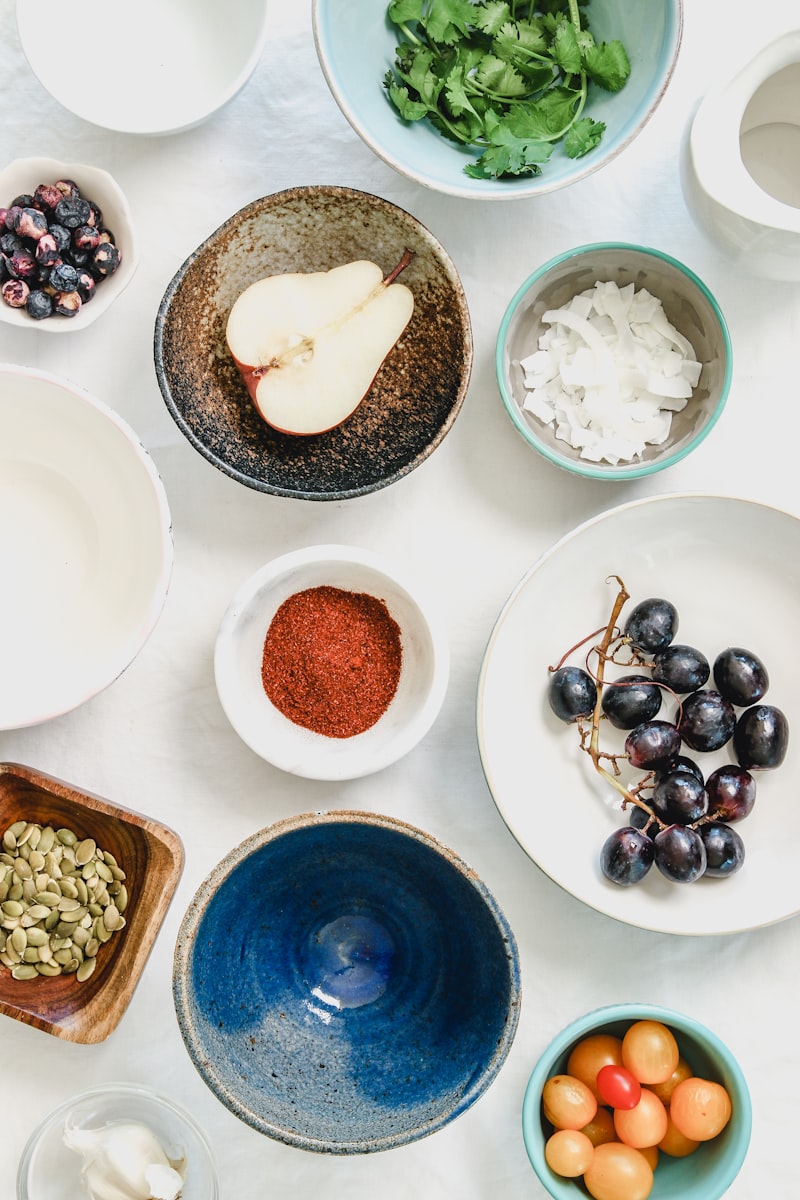
This article highlights the importance and benefits of incorporating essential herbs into cooking, focusing on engaging language and useful information for the reader.
From Garden to Table: Fresh Herbs for Healthy Culinary Delights
When you cultivate herbs in your garden, you’re not just growing plants; you’re nurturing a culinary experience. Picture this: you step outside, scissors in hand, and snip off some parsley for your pasta sauce. That dash of green not only enhances the taste but also adds essential nutrients like vitamins A, C, and K to your dish. It’s a simple way to infuse your cooking with both flavor and goodness.
Herbs are versatile. Whether you’re grilling, baking, or making a salad, there’s an herb that can complement your recipe perfectly. Rosemary with its robust aroma pairs beautifully with roasted potatoes. Thyme brings a warm, earthy note to soups and stews. And let’s not forget the delicate allure of chives sprinkled over a creamy omelet.
The journey from garden to table is not just about taste; it’s about the joy of creation. As you nurture your herb plants, you witness their growth and transformation. It’s a satisfying feeling to see your basil plants flourish under your care and then harvest them to create a zesty caprese salad. The pride and satisfaction that come from growing your own herbs enrich every mealtime.
Moreover, having fresh herbs at hand encourages healthier eating habits. When you have a basil plant thriving on your windowsill, you’re more likely to choose a homemade bruschetta over a store-bought snack. It’s a small step towards a healthier lifestyle that starts right in your own kitchen.
The Healing Kitchen: How Herbs and Spices Boost Wellness
Herbs and spices have been revered for centuries across various cultures for their medicinal properties. Take turmeric, for instance, known for its vibrant color and earthy flavor. This golden spice contains curcumin, a compound celebrated for its anti-inflammatory and antioxidant effects. Incorporating turmeric into your diet not only adds depth to your cooking but also supports joint health and boosts immunity.
Similarly, ginger, with its zesty warmth, is a staple in many kitchens and traditional medicines. Beyond its ability to spice up stir-fries and teas, ginger aids digestion, eases nausea, and may even alleviate muscle pain. Its versatility makes it a go-to remedy for various ailments, from indigestion to motion sickness.
For those seeking to calm the mind and promote relaxation, chamomile is a gentle herb that offers soothing qualities. Often brewed as a tea, chamomile helps reduce anxiety, improve sleep quality, and soothe digestive discomfort. Its delicate floral notes make it a comforting addition to any evening routine.
In the realm of aromatic herbs, rosemary stands out not only for its savory taste but also for its cognitive benefits. This herb is believed to enhance memory and concentration, making it a favorite among students and professionals alike. Its robust flavor pairs well with roasted meats and vegetables, adding not just taste but also a mental boost to your meals.
Mastering Herbology: Cooking Techniques for Vibrant Health
Hey there, herb enthusiasts! Today, let’s dive into the wonderful world of herbology and explore some cooking techniques that can elevate your health to new heights. Imagine your kitchen as a magical apothecary, where each herb isn’t just a flavor enhancer but a potent elixir for vibrant living.
First off, let’s talk about steeping and infusing. These techniques are like steeping a tea bag but with herbs. Simply steeping fresh herbs in hot water can create a soothing herbal tea that’s not only refreshing but also brimming with health benefits. Whether it’s mint for digestion or chamomile for relaxation, a steaming cup of herb-infused tea can work wonders.
Next up, we have herb rubs and marinades. Imagine your favorite cut of meat or vegetables coated in a flavorful herb rub before grilling or roasting. The herbs not only add a burst of taste but also infuse their goodness into your dish. It’s like giving your food a healthy makeover without sacrificing taste.
Now, let’s explore the art of herb garnishes. It’s not just about making your plate look pretty (although that’s a nice bonus). Adding fresh herbs like parsley, cilantro, or basil to your finished dishes can provide a final punch of flavor and a burst of color. It’s like adding the perfect accessory to complete your culinary masterpiece.
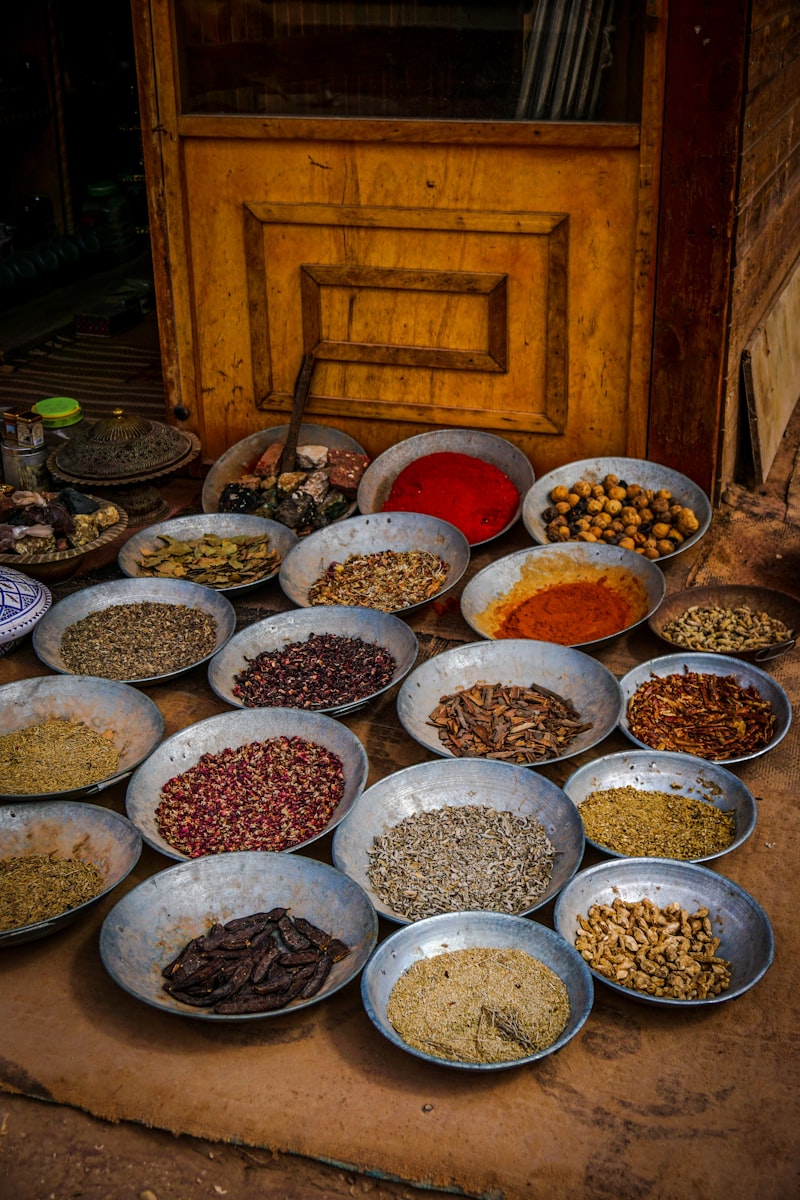
And how about herb-infused oils and vinegars? These are like the secret weapons of herb lovers. Infusing olive oil with rosemary or thyme adds a subtle herbaceous note to dressings and marinades. Similarly, a splash of herb-infused vinegar can transform a simple salad into a gourmet experience.
Last but not least, let’s not forget herb butter. Picture creamy butter blended with chopped herbs like chives or tarragon. This herb-infused butter can be spread on bread, melted over vegetables, or used to finish off a sizzling steak. It’s decadence with a healthy twist.
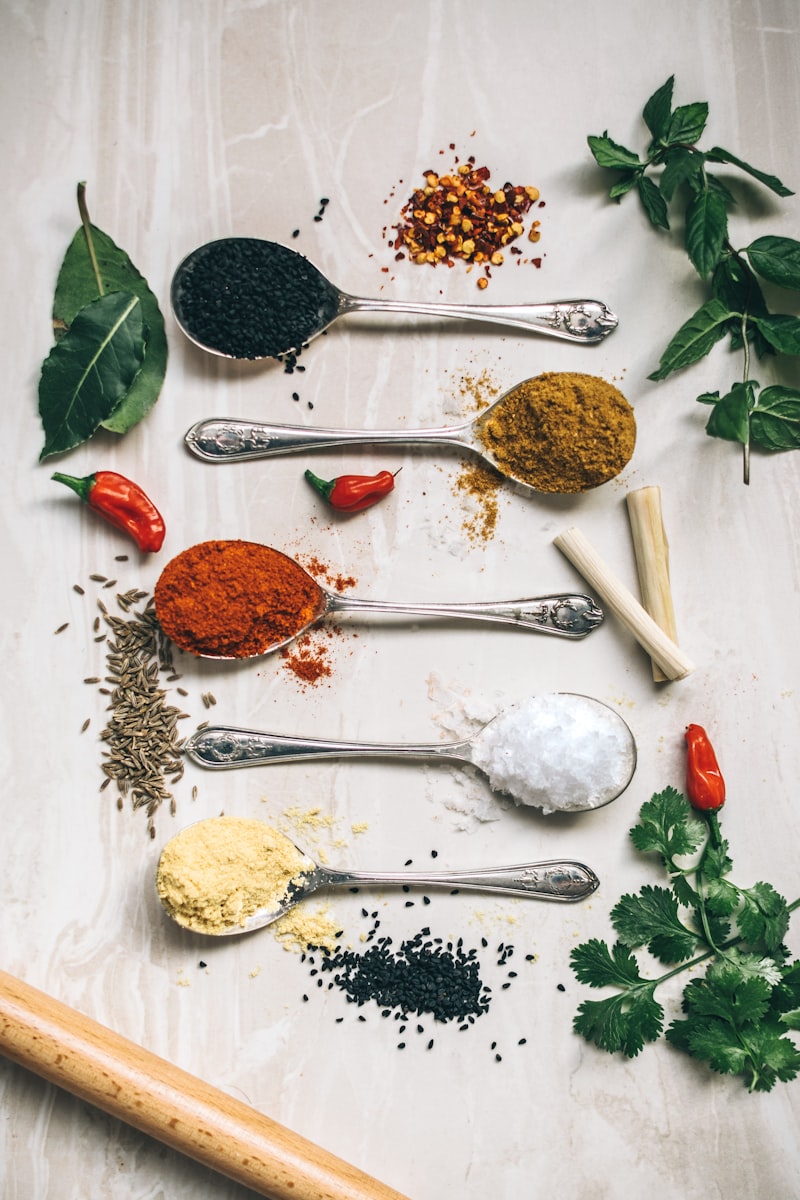
So there you have it—five simple yet powerful techniques to master herbology in your kitchen. Whether you’re a seasoned chef or a novice cook, incorporating these methods into your culinary repertoire can bring both flavor and vitality to your meals. Experiment, explore, and savor the goodness of herbs in every bite.
Frequently Asked Questions
Which herbs and spices are best for enhancing flavor without adding extra calories?
Discover how to enhance flavor without extra calories using herbs and spices. Learn about top choices like basil, cilantro, paprika, and more, perfect for healthier cooking without sacrificing taste.
Are there any common herbs and spices that have medicinal properties?
Discover common herbs and spices renowned for their medicinal properties. Explore natural remedies that harness the healing potential of these botanicals.
What are some tips for storing herbs and spices to maintain freshness?
Discover effective methods for storing herbs and spices to preserve their freshness longer. Learn about ideal storage conditions, such as keeping them away from heat, light, and moisture, and using airtight containers. Find out how to label and organize your spices for easy access and potency retention.
What are the health benefits of cooking with herbs and spices?
Discover the health benefits of cooking with herbs and spices, known for enhancing flavor and providing antioxidants, vitamins, and minerals. These natural ingredients can promote digestion, reduce inflammation, and support overall well-being.
How can I incorporate herbs and spices into my daily meals?
Learn how to enhance your daily meals with herbs and spices for added flavor and health benefits. Discover simple techniques and recipes to incorporate a variety of herbs and spices into your cooking effortlessly.


